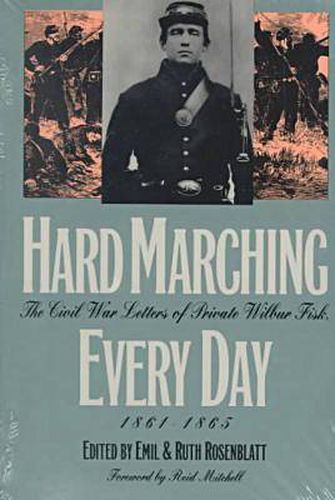Readings Newsletter
Become a Readings Member to make your shopping experience even easier.
Sign in or sign up for free!
You’re not far away from qualifying for FREE standard shipping within Australia
You’ve qualified for FREE standard shipping within Australia
The cart is loading…






As a war correspondent, Wilbur Fisk was an amateur, yet his letters to the Montpelier
Green Mountain Freeman
comprise one of the finest collections of Civil War letters in existence. But Fisk was no novelist. He was a rural school teacher from Vermont, primarily self-educated, who enlisted in the Union Army simply because he believed he would regret it later if he didn’t. Between December 11, 1861, and July 26, 1865, Fisk wrote nearly 100 letters from the battlefield. At the beginning of the war he was exuberant and eager for contact with the enemy. Two years later, Fisk was disillusioned and war weary:
The rebel dead and ours lay thickly together, their thirst for blood forever quenched. Their bodies were swollen, black and hideously unnatural. Their eyes glared from their sockets, their tongues protruded from their mouths, and in almost every case, clots of blood and mangled flesh showed how they had died, and rendered a sight ghastly beyond description. I though I had become hardened to almost anything, but I cannot say I ever wish to see another sight like that I saw on the battle-field of Gettysburg . Unlike professional war correspondents, Private Fisk had no access to rank or headquarters. Instead, he wrote of life as a private - as one of the foot soldiers who slept in the mud and obeyed orders no matter how incomprehensible.
$9.00 standard shipping within Australia
FREE standard shipping within Australia for orders over $100.00
Express & International shipping calculated at checkout
As a war correspondent, Wilbur Fisk was an amateur, yet his letters to the Montpelier
Green Mountain Freeman
comprise one of the finest collections of Civil War letters in existence. But Fisk was no novelist. He was a rural school teacher from Vermont, primarily self-educated, who enlisted in the Union Army simply because he believed he would regret it later if he didn’t. Between December 11, 1861, and July 26, 1865, Fisk wrote nearly 100 letters from the battlefield. At the beginning of the war he was exuberant and eager for contact with the enemy. Two years later, Fisk was disillusioned and war weary:
The rebel dead and ours lay thickly together, their thirst for blood forever quenched. Their bodies were swollen, black and hideously unnatural. Their eyes glared from their sockets, their tongues protruded from their mouths, and in almost every case, clots of blood and mangled flesh showed how they had died, and rendered a sight ghastly beyond description. I though I had become hardened to almost anything, but I cannot say I ever wish to see another sight like that I saw on the battle-field of Gettysburg . Unlike professional war correspondents, Private Fisk had no access to rank or headquarters. Instead, he wrote of life as a private - as one of the foot soldiers who slept in the mud and obeyed orders no matter how incomprehensible.